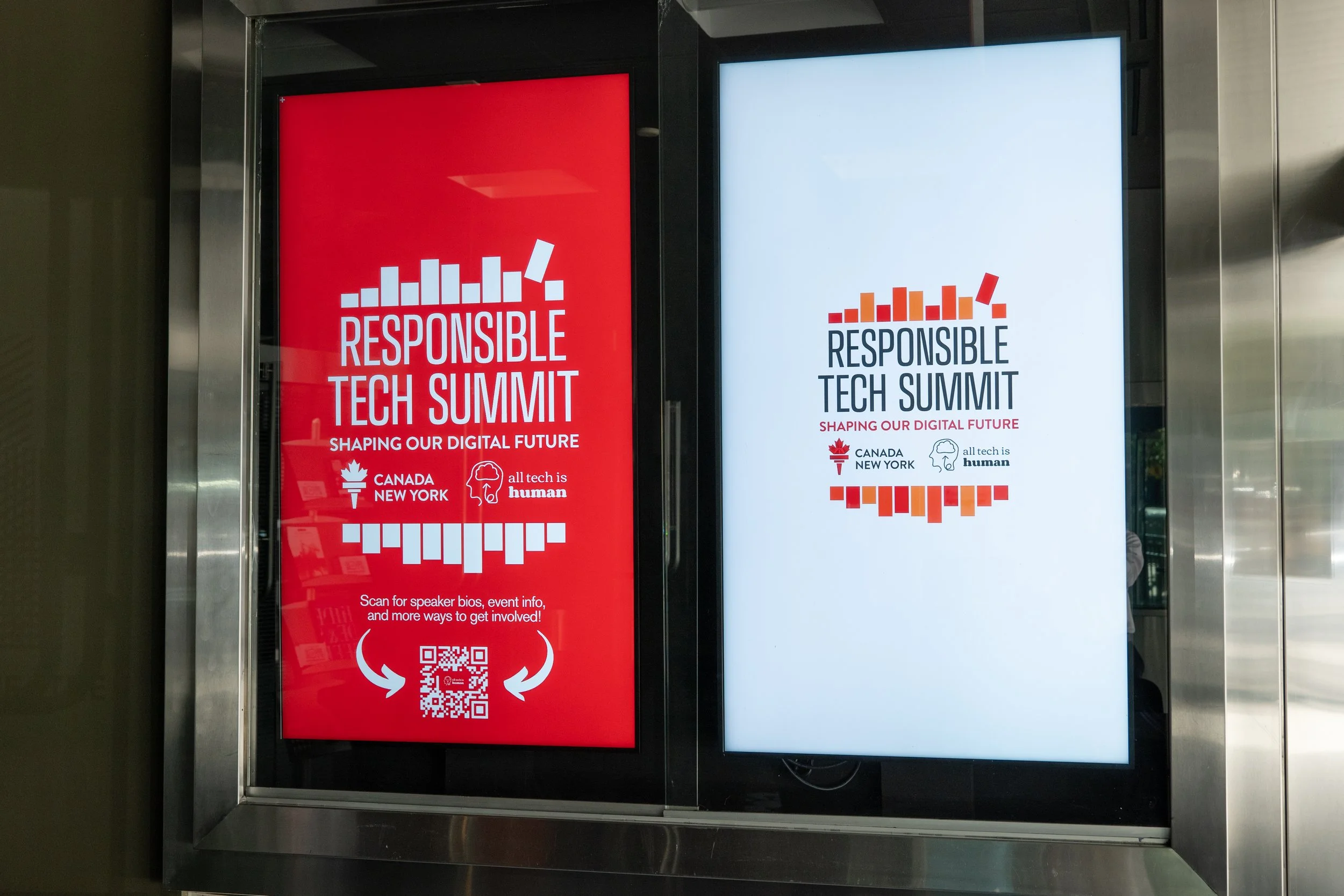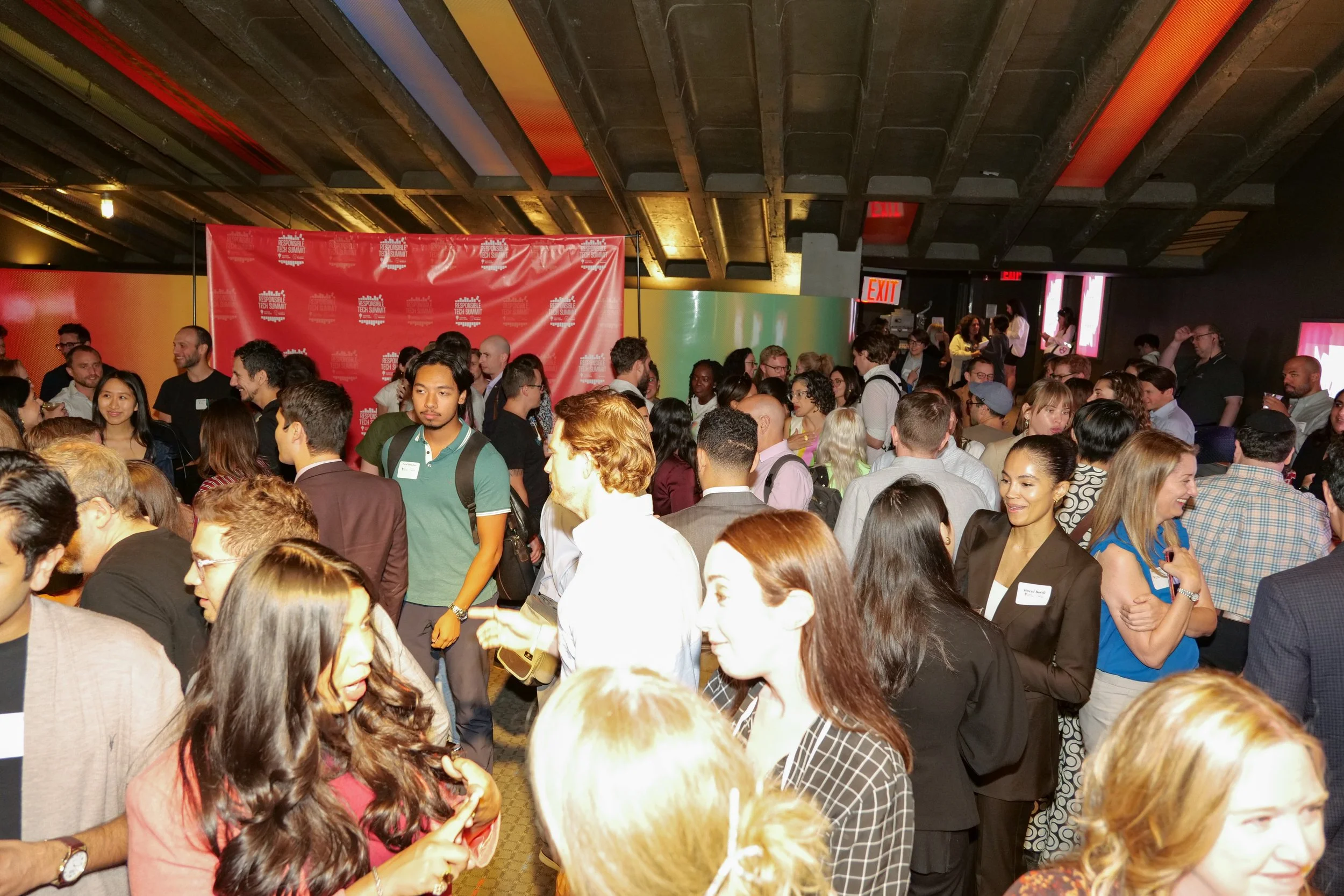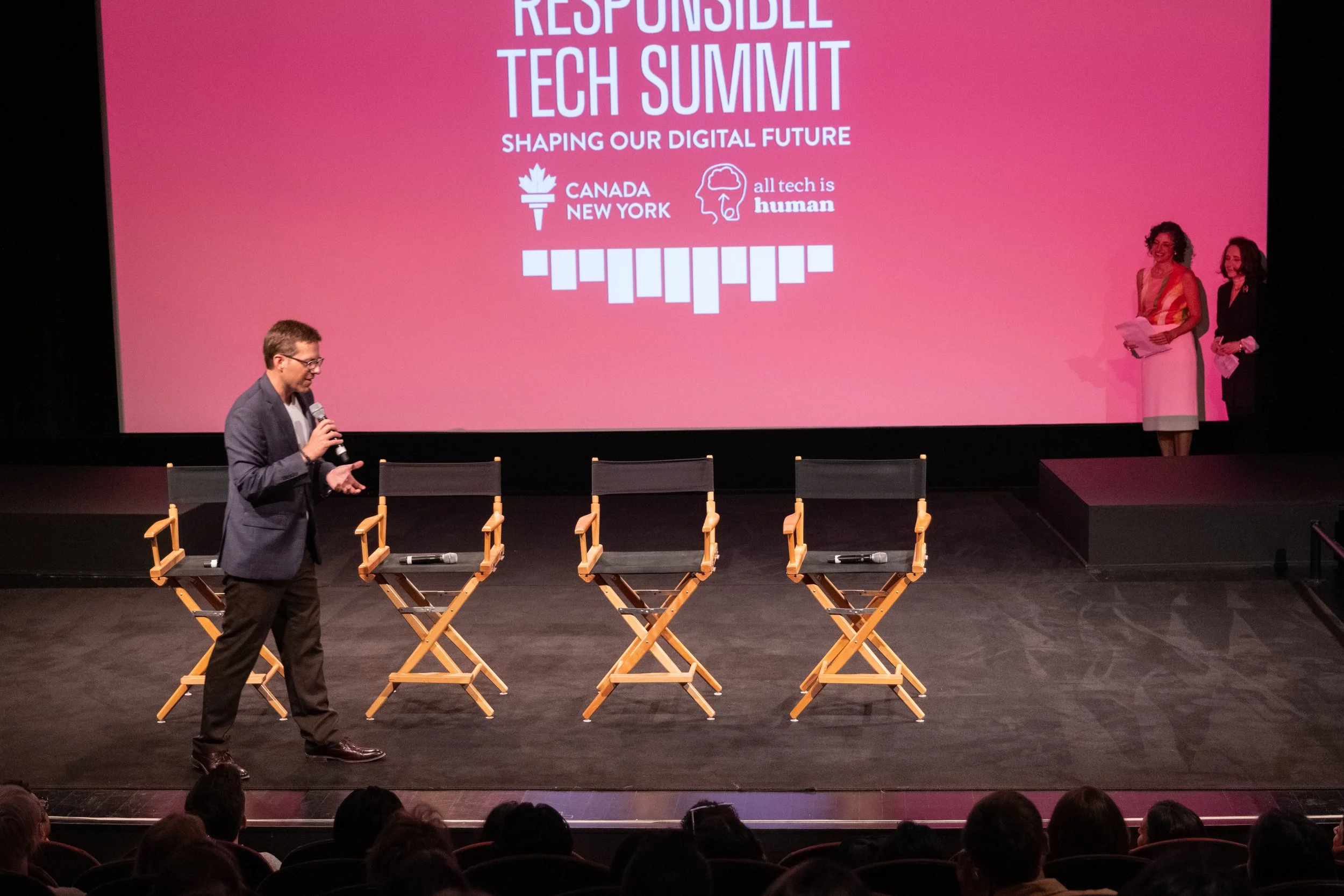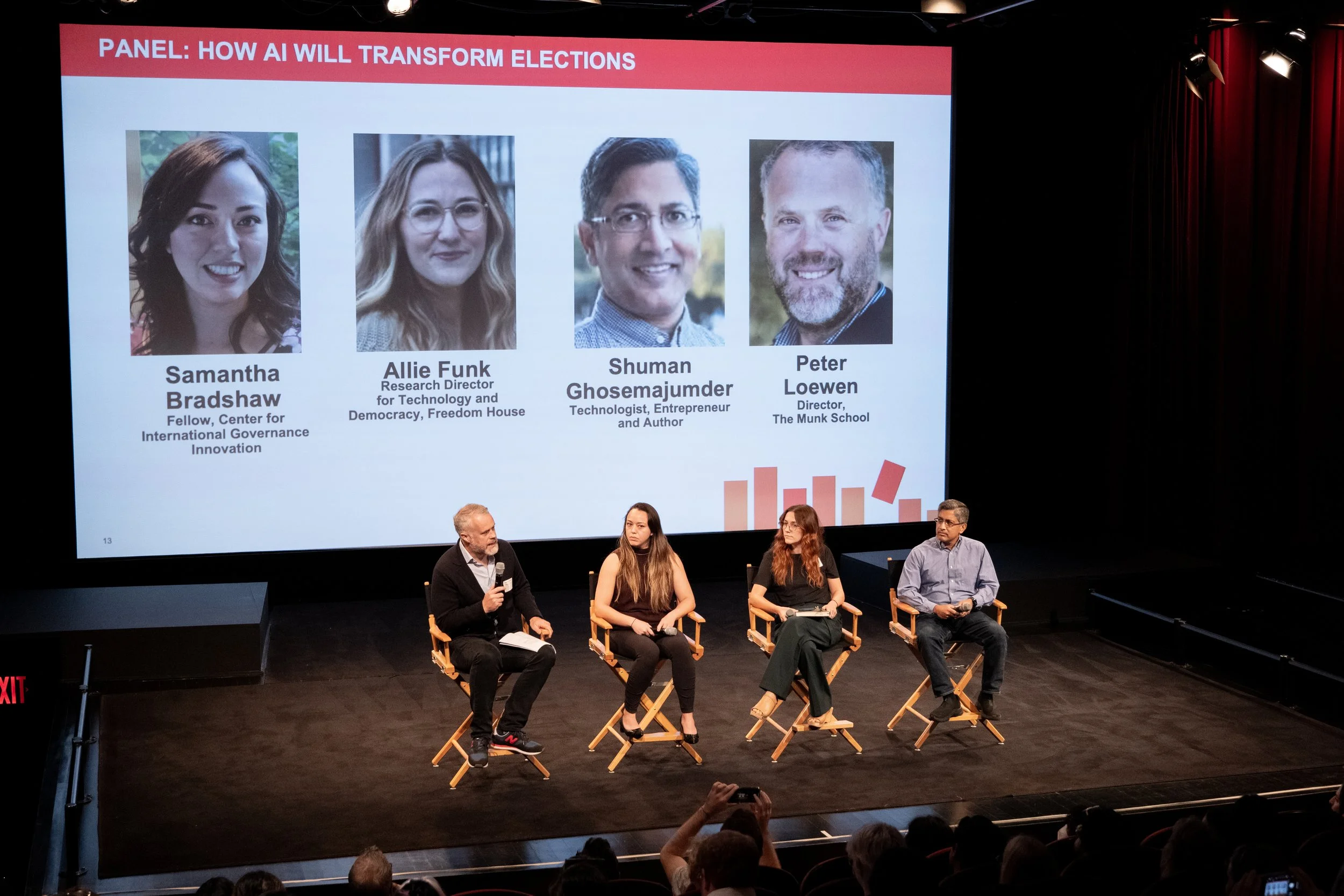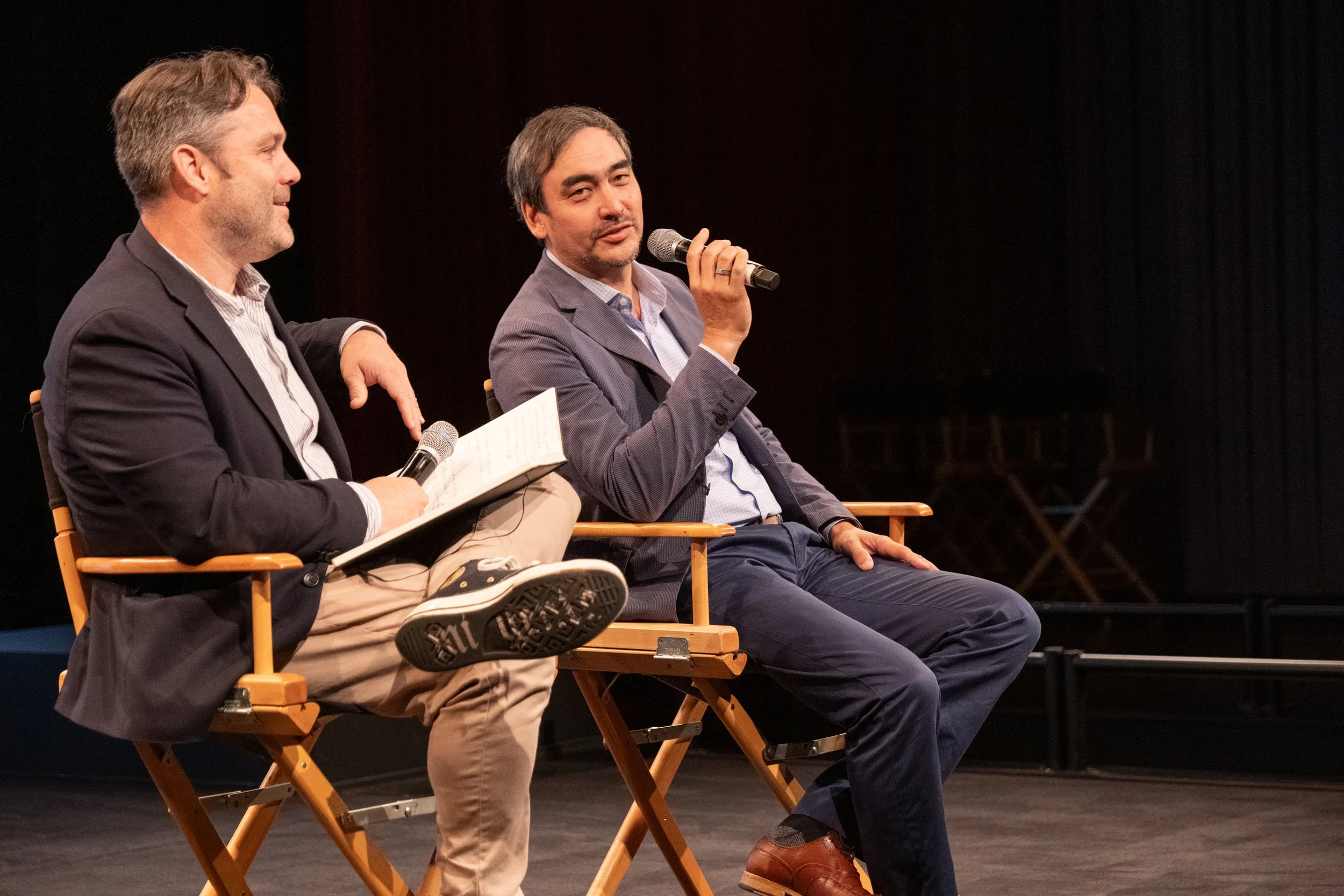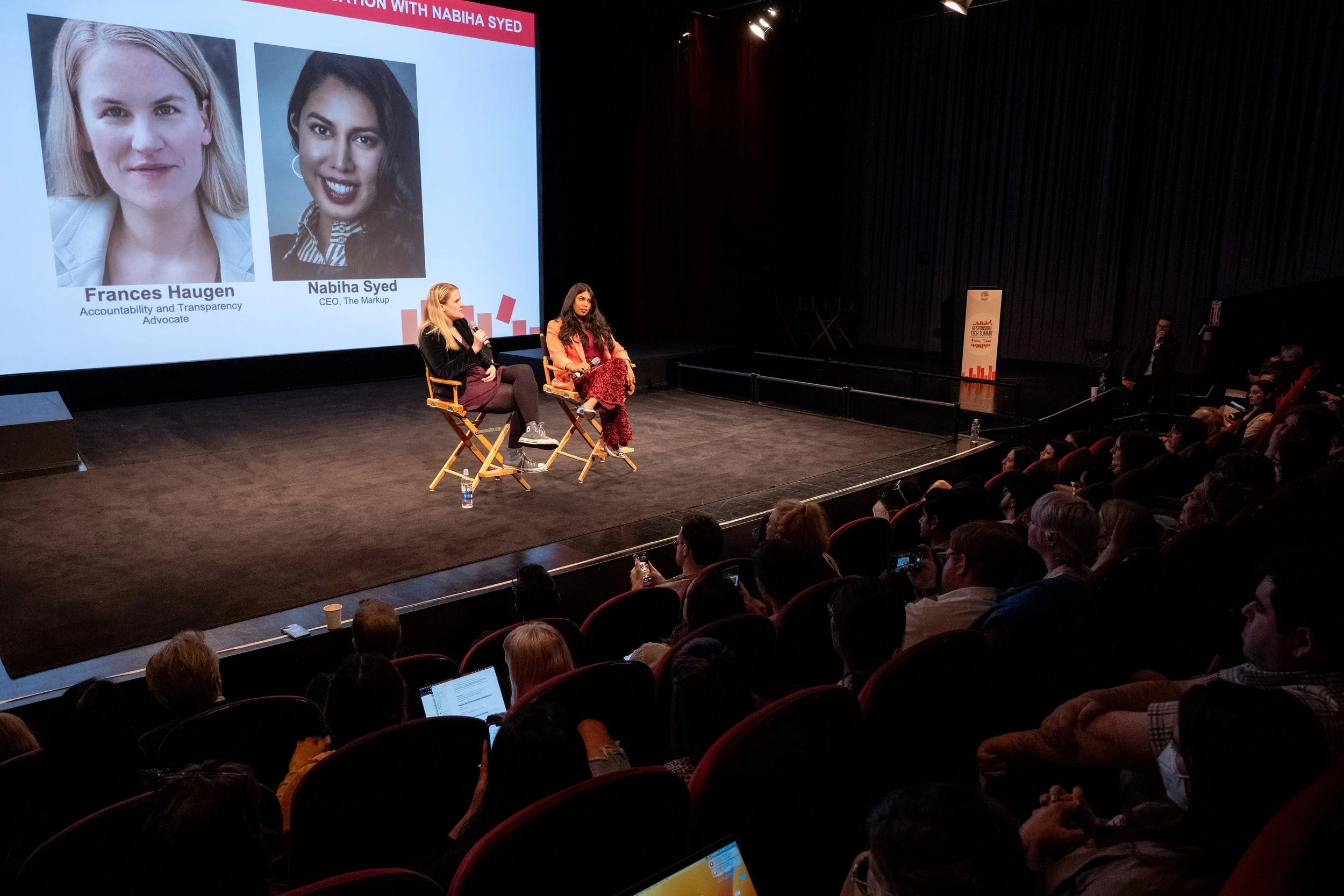A Recap of the Responsible Tech Summit: Shaping Our Digital Future
All Tech Is Human recently held its Responsible Tech Summit in NYC on September 14, 2023, in partnership with the Consulate General of Canada in New York. Approximately 300 people came together across civil society, government, industry, and academia to better understand the multitude of issues (the impact of AI, connection crisis, business models, social media & mental health) facing our society and how we can shape our digital future to better align with the public interest.
Fireside chats included Sherry Turkle in conversation with Julie Scelfo, Tim Wu in conversation with Justin Hendrix, and Frances Haugen in conversation with Nabiha Syed. We also held a panel on How AI Will Transform Elections, and a panel on Digital Spaces and Public Goods.
The day opened with a welcome by André Frenette, Deputy Consul General, followed by All Tech Is Human’s Founder & President David Ryan Polgar.
Sherry Turkle is the Abby Rockefeller Mauzé Professor of the Social Studies of Science and Technology in the Program in Science, Technology, and Society at MIT, and the founding director of the MIT Initiative on Technology and Self. Her previous books include the New York Times bestseller Reclaiming Conversation: The Power of Talk in a Digital Age, Alone Together: Why We Expect More from Technology and Less from Each Other; The Second Self: Computers and the Human Spirit; Life on the Screen: Identity in the Age of the Internet; and Simulation and Its Discontents. Her newest book, The Empathy Diaries: A Memoir, ties together her personal story with her groundbreaking research on technology, empathy, and ethics.
Julie Scelfo is an award-winning journalist and Founder & Executive Director of Get Media Savvy, a nonprofit working to establish a healthy media environment for kids and families. The organization is catalyzing a nationwide embrace of 21st-century media literacy survival skills using an array of pop culture strategies. She is also a parent of three who believes in prioritizing people over technology.
The stakes for global democracy are high in 2024, as major elections are scheduled in India, South Africa, South Korea, Ukraine, the U.S., and more. Recent advancements in AI technology have the potential to transform the electoral landscape, with experts warning that generative AI and deepfakes may be powerful tools to spread misinformation on social media. How are policymakers and the private sector responding to put safeguards in place ahead of elections? How can civil society groups help monitor threats and counter misinformation? Are there emerging AI tools that can help strengthen democratic debate and boost voter confidence?
Samantha Bradshaw, Fellow, Center for International Governance Innovation
Samantha Bradshaw is a CIGI fellow and a leading expert on technology and democracy. Her research concerns the politics embedded in information and communication technologies, and how political actors exploit these affordances for propaganda and persuasion.Samantha completed her Ph.D. at the Oxford Internet Institute and is a post-doctoral fellow at Stanford University, where she contributes to the work of the Internet Observatory and the Digital Civil Society Lab. Her research and writing on foreign influence operations, disinformation and platform governance have been published in leading academic journals, including New Media & Society, Policy & Internet, Internet Policy Review and the Columbia Journal of International Affairs. Her work and public writing have also been featured by numerous media outlets, including The New York Times, The Washington Post, The Globe and Mail, the Financial Times, CNN and Bloomberg News. Samantha has spoken on expert panels and delivered keynote lectures around the world, including to the United Nations Educational, Scientific and Cultural Organization and the North Atlantic Treaty Organization. She has also been involved in public policy discussions in the United Kingdom, Canada and the United States, briefing officials and providing expert-witness testimony to several ongoing political processes about the effects of technology on democracy.
Allie Funk, Research Director for Technology and Democracy, Freedom House
As Research Director for Technology and Democracy, Allie serves as an expert on human rights in the digital age. She leads Freedom House's technology and democracy initiative, including Freedom on the Net, Election Watch for the Digital Age, and work related to protecting a free and open internet. She also represents Freedom House on the Freedom Online Coalition's Advisory Network, and serves on the Global Network Initiative's Board of Directors. Her writing has been published in the Washington Post, the Los Angeles Times, WIRED, Lawfare, the Hill, the Diplomat, and Just Security, among others.
Prior to joining Freedom House, Allie worked at the National Association of Criminal Defense Lawyers on issues relating to U.S. surveillance, closing the Guantanamo Bay detention facility, and the right to counsel, and also worked with Human Rights First’s foreign policy team. She holds a master's degree in human rights from the London School of Economics and Political Science and a B.A. in philosophy and political science from the University of Louisville.
Shuman Ghosemajumder is a Canadian technologist, entrepreneur, and author. He is the former click fraud czar at Google, the author of works on technology and business including the Open Music Model, and co-founder of TeachAids. He was chief technology officer for Shape Security, which was acquired in 2020 for $1 billion by F5 Inc where he became head of artificial intelligence.
Peter John Loewen, Director at University of Toronto - Munk School of Global Affairs & Public Policy
Professor Peter Loewen is the Director of the Munk School of Global Affairs & Public Policy. Professor Loewen teaches in the Department of Political Science and the Munk School. Professor Loewen’s work has been published in Proceedings of the National Academy of Sciences, Nature Medicine, Nature Human Behaviour, American Political Science Review, American Journal of Political Science, Journal of Politics, British Journal of Political Science, Political Research Quarterly, Transactions of the Royal Society B, and Journal of Economic Behavior and Organization, and other journals. He has edited four books and is a regular contributor to the media, including the New York Times, Washington Post, Globe & Mail, Toronto Star and National Post.
Tim Wu is an author, policy advocate, and professor at Columbia Law School. Wu's best known work is the development of Net Neutrality theory, but he also writes about private power, free speech, copyright, and antitrust. His books The Master Switch and The Attention Merchants have won wide recognition and awards.
Justin Hendrix is CEO and Editor of Tech Policy Press, a new nonprofit media venture concerned with the intersection of technology and democracy. Previously, he was Executive Director of NYC Media Lab. He spent over a decade at The Economist in roles including Vice President, Business Development & Innovation. He is an associate research scientist and adjunct professor at NYU Tandon School of Engineering. Opinions expressed here are his own.
Frances Haugen is an advocate for accountability & transparency in social media. Born in Iowa City, Iowa, Frances is the daughter of two professors and grew up attending the Iowa caucuses with her parents, instilling a strong sense of pride in democracy and responsibility for civic participation.
Frances holds a degree in Electrical and Computer Engineering from Olin College and a MBA from Harvard University. She is a specialist in algorithmic product management, having worked on ranking algorithms at Google, Pinterest, Yelp and Facebook. In 2019, she was recruited to Facebook to be the lead Product Manager on the Civic Misinformation team, which dealt with issues related to democracy and misinformation, and later also worked on counter-espionage.
Nabiha Syed is the chief executive officer of The Markup. She oversees The Markup’s strategy, growth plans and business operations. Nabiha also oversees legal, communications, personnel and other operational matters.
Before joining The Markup, Nabiha was vice president and associate general counsel at BuzzFeed, where she counseled on newsgathering, libel, and privacy matters worldwide. Under her leadership, the company successfully defended against libel litigation arising out of the publication of the Steele dossier and initiated numerous notable access litigations. Prior to BuzzFeed, Syed co-founded the nation’s first media access law clinic, currently in its 10th year of operation at Yale Law School, and served as a First Amendment Fellow at The New York Times.
We have come to rely on the Internet to provide access to government services, educational materials and resources, serve as an advocacy tool, build coalitions, and provide public goods. As a result, the internet and digital spaces have come to influence civic life and civic engagement in evolving ways. Moreover, digital civic engagement is rapidly evolving with the general public gaining more access to emerging technologies, such as generative artificial intelligence. Yet the transparency and accountability mechanisms of many of the tech platforms that facilitate these engagements are limited. This panel will explore how to create and expand healthy digital spaces, give examples of current existing healthy spaces, best practices, and what future spaces might look like from a global lens. Consideration will be given to how to create digital spaces that work for all current and future users, especially those from the global majority, and how to foster digital inclusion, diversity, and innovation.
Sinead Bovell, Futurist, WAYE Founder
Sinead Bovell is a futurist and the founder of WAYE, an organization that prepares youth for a future with advanced technologies, with a focus on non-traditional and minority markets. Sinead is a regular tech commentator for CNN, talk shows, and morning shows; she's been dubbed the A.I. educator for the “non-nerds” by Vogue Magazine; and to date has educated over 200, 000 young entrepreneurs on the future of technology.
Sinead is a 8x United Nations speaker; she has given formal addresses to presidents, royalty and Fortune 500 leaders on topics ranging from cybersecurity to artificial intelligence, and currently serves as a strategic advisor to the United Nations International Telecommunication Union on digital inclusion.
Sabhanaz Rashid Diya, Co-Founder, Tech Global Institute
Sabhanaz Rashid Diya is the founding member at Tech Global Institute, a global policy lab with a mission to reduce equity and accountability gaps between technology platforms and the majority world. She is trained as a computational social scientist with over 17 years of experience at the intersection of technology policy, ethics and global development. She was previously the Head of Public Policy for Bangladesh at Meta, where she engaged policymakers and led on various regulatory and legislative issues, including hate speech, privacy, data protection and the data economy, online harms and algorithmic transparency. Diya also worked at the Bill & Melinda Gates Foundation, leading policy and advocacy efforts in multidisciplinary digital economy, data and artificial intelligence. Her career spans across private and public sector in the U.S., Asia and Africa, including USAID and the World Bank, on fintech, national security, digital trade and Internet governance. She is the founding Board Director for U.S. Bangladesh Business Council at the U.S. Chamber of Commerce. She holds a Master's degree in public policy and data science from the University of California, Berkeley, and is a Asia 21 Leader at the Asia Society and a Term Member at Council on Foreign Relations.
Patrick K. Lin, AI Expert on Snap’s Safety Advisory Board and Author of Machine See, Machine Do
Patrick K. Lin is the author of Machine See, Machine Do, an approachable and informative book that explores the ways public institutions use technology to surveil, police, and make decisions about the public, as well as the historical biases that impact that technology. His research focuses on AI, privacy law, technology policy and regulation, and copyright. Previously, Patrick worked for the ACLU's Speech, Privacy & Technology Project, FTC, and EFF, among others. He also serves on the junior board of the Surveillance Technology Oversight Project (STOP) and advises Snap Inc. as an AI specialist on its Safety Advisory Board.
He is a frequent speaker on AI, civil rights law, the history and politics of surveillance, and technology regulation. Patrick has presented before a wide range of professional and academic groups, including Stanford University, UNC School of Law, State of the Net, Cloudflare TV, and various podcasts. Patrick’s research has been published in reputable law journals, including the Fordham Environmental Law Review, Albany Law Journal of Science & Technology, and Santa Clara Law Review. His work has been featured in ArtAsiaPacific, Built In, Tech Policy Press, Politico, and ABILITY Magazine.
Theodora Skeadas is a Public Policy Strategic Advisor and advances Responsible Technology Development. This year, she has also been consulting with Carnegie Endowment for International Peace's Partnership for Countering Influence Operations on government efforts to combat disinformation in Ukraine, National Democratic Institute on online gender-based violence and women’s political participation, and the Committee to Protect Journalists on a journalist safety tool, and she works part-time as the Executive Director of Cambridge Local First, a community nonprofit that addresses economic development issues.
Previously at Twitter, she managed the Trust and Safety Council, a research hub within the Public Policy team, and a trusted flaggers program for human rights defenders, and she supported the Twitter Moderation Research Consortium. Before that, she spent five years working in national security at Booz Allen Hamilton, examining public sentiment, social movements, and disinformation using social media for the U.S. Federal Government. Previously, she worked with nonprofits in Morocco (Search for Common Ground, Innovations for Poverty Action, Sidi Moumen Cultural Center, and Sister Cities International - Africa), Turkey (Fulbright), Palestine (Inspire Dreams), Greece (Center for Hellenic Studies), and Costa Rica (World Teach).
Camille Carlton, Senior Policy Manager, Center for Humane Technology
Camille is the Senior Policy Manager at Center for Humane Technology. She previously worked on technology research at UC Berkeley, where she examined issues of power, governance, and shared prosperity. She is an Aspen Tech Policy Scholar, holds a master’s degree in economic development from the London School of Economics and Political Science, and has been published in Science.



